Blockchain
Monero P2P Trading Platform Closes and Raises Concerns

Monero P2P trading platform closes and raises concerns within the community of cryptocurrency users who value privacy.
The closure of this significant platform, which had long been a hub for Monero enthusiasts, underscores the challenges and risks facing decentralized exchanges in today’s evolving regulatory landscape.
Monero has gained popularity as a privacy-focused cryptocurrency due to its ability to provide secure and anonymous transactions, making it a preferred choice for users prioritizing privacy.
However, the platform’s closure was attributed to a mix of factors, including increased regulatory pressures, operational challenges, and security vulnerabilities.
This development impacts Monero’s market liquidity and raises questions about the future of decentralized platforms.
We will look into the reasons behind the shutdown, its effect on the Monero community, and the potential future of decentralized cryptocurrency trading platforms in an ever-changing environment.
Understanding Monero and P2P Trading Platforms
Monero (XMR) is a privacy-centric cryptocurrency that aims to provide secure, untraceable, and fungible transactions.
Monero (XMR):
Unlike Bitcoin, which offers pseudo-anonymity, Monero employs advanced cryptographic techniques like Ring Signatures, Ring Confidential Transactions (RingCT), and stealth addresses to ensure transaction privacy. These features make Monero a popular choice among individuals prioritizing financial privacy and anonymity.
P2P Trading Platforms:
Peer-to-peer (P2P) trading platforms enable direct transactions between buyers and sellers without intermediaries, providing a decentralized alternative to traditional exchanges. For privacy-focused cryptocurrencies like Monero, P2P platforms create an environment aligned with users’ desire for anonymity, often offering secure escrow systems, reputation-based trading, and end-to-end encrypted communication.
The Platform’s History:
The platform emerged as a significant player in Monero trading, providing a space where like-minded users could trade directly and securely. Its ease of use and privacy-centric features quickly attracted a loyal user base, making it a critical node in the Monero trading ecosystem. However, its recent closure has left a noticeable gap, compelling traders to seek alternative venues.
Monero P2P Trading Platform Closes Because of Presure Regarding privacy focused trading.
Increased regulatory scrutiny on cryptocurrencies has created a challenging environment for decentralized platforms. Many governments are pushing for tighter controls on crypto exchanges to curb illicit activities.
Regulatory Pressures:
The P2P Monero platform was under immense pressure due to its association with privacy-focused trading. Compliance requirements, such as know-your-customer (KYC) regulations and anti-money laundering (AML) policies, posed significant challenges, prompting the platform’s operators to shut down rather than compromise their values or face legal consequences.
Operational Challenges:
Decentralized platforms require robust infrastructure to handle transactions securely and efficiently. However, maintaining such infrastructure has significant operational challenges, including server management, user support, and technical updates. The Monero P2P platform struggled to keep up with increasing operational demands, particularly as its user base grew. Technical glitches, insufficient resources, and increasing server costs further strained the platform’s sustainability.
Security Concerns:
Security is paramount in any trading platform, but decentralized exchanges face unique challenges. The Monero platform had to combat various security threats, including scams, hacks, and fraudulent listings. Despite employing security measures like escrow systems and reputation-based trading, malicious actors still exploited vulnerabilities. Rising security issues compromised user funds and eroded trust in the platform, accelerating its decline.
Impact on the Monero Community
Liquidity Challenges:
The closure of the P2P trading platform has affected Monero’s liquidity, particularly in the P2P market segment. With fewer active marketplaces supporting Monero, traders have experienced challenges finding reliable platforms, which has reduced trading activity and liquidity. This decline makes it harder for buyers and sellers to conduct transactions quickly and at favourable prices.
Alternative Trading Solutions:
Despite the closure, Monero trading continues through various other avenues. Decentralized exchanges (DEXs) like Bisq and open-source platforms like LocalMonero offer alternative trading solutions. Centralized exchanges (CEXs) like Kraken and Binance also facilitate Monero trading, albeit with varying degrees of privacy. OTC (over-the-counter) markets and private trading networks also provide options for traders seeking more personalized trading experiences.
User Trust and Confidence:
The sudden shutdown has shaken user confidence in decentralized platforms, particularly those prioritizing privacy over compliance. Many users have expressed concerns about the reliability and security of P2P platforms, prompting a shift towards more regulated exchanges or private trading networks. Restoring user trust will require significant improvements in platform security, transparency, and regulatory compliance.
Parrot Bamboo said at Binance Square:
📣 LocalMonero, the largest peer-to-peer Monero trading platform, announced that it is closing after approximately 7 years of operation. $XMR

The Future of Decentralized Cryptocurrency Platforms
Regulatory Compliance:
For decentralized platforms, regulatory compliance is still a major obstacle. A careful balance must be struck between navigating changing international rules and protecting user privacy.
Platforms must adopt innovative compliance strategies, such as decentralized KYC protocols or community-driven governance models, to remain operational without compromising their core values.
Security Innovations:
Security innovations must be prioritized on decentralized platforms to avert security breaches and restore confidence.
Implementing advanced encryption, multi-signature wallets, and decentralized identity verification can enhance platform security.
Additionally, community-based security audits and bug bounty programs can help identify and address vulnerabilities proactively.
Decentralized Exchange Development:
The growth of decentralized exchanges (DEXs) signifies shifting towards a more secure and user-centric trading model. DEXs like Uniswap and Bisq are gaining traction due to their non-custodial nature and robust security features. However, challenges such as low liquidity, user experience issues, and regulatory uncertainty still hinder their widespread adoption.
Improving cross-chain interoperability, incentivizing liquidity providers, and simplifying user interfaces could accelerate DEX development.
Final Thoughts and FAQ:
The closure of a prominent Monero P2P trading platform has highlighted the complexities and challenges of operating in a rapidly changing regulatory environment. While privacy-centric cryptocurrencies like Monero appeal to users seeking anonymity, platforms supporting these currencies must navigate a delicate balance between compliance and user privacy. The shutdown has affected Monero’s liquidity and raised concerns within the community, but alternatives such as decentralized exchanges and private trading networks still offer viable trading solutions. Moving forward, decentralized platforms must prioritize security, compliance, and innovation to regain user trust and continue providing safe, reliable environments for peer-to-peer trading. The future of decentralized trading depends on striking the right balance between privacy, security, and adaptability to an evolving regulatory landscape.
FAQs
Q.: Why did the Monero P2P trading platform close?
A.: The platform cited regulatory pressures, security concerns, and operational challenges as primary reasons.
Q.: What alternatives exist for Monero P2P trading?
A.: Decentralized exchanges (DEXs) like Bisq and other P2P platforms still support Monero trading.
Q.: How does this closure affect Monero trading?
A.: It may reduce liquidity and impact confidence in P2P platforms.
Q.: What makes Monero unique among cryptocurrencies?
A.:Monero is known for its strong privacy features, such as RingCT and stealth addresses.
Q.: Is Monero still safe to trade?
A.: Yes, trading Monero remains safe, provided users utilize trusted platforms with robust security features.
Blockchain
5 Reasons Why Delta Exchange is the Easiest Platform for Crypto Trading Strategies in the Indian Market

Crypto trading in India has grown exponentially in the last few years. In 2025, the market pulled in $258 million in revenue and is on track to hit nearly $732 million by 2033, growing at a 14.3% CAGR from 2026 onwards. That kind of money doesn’t come from people buying Bitcoin on a whim and hoping for a lucky spike. It comes from traders who plan entries, manage exits, build hedges, and run full-blown crypto trading setups.
This shift has created a new problem. Most Indian crypto exchange apps still feel built for basic spot buying without any advanced features to try. You open five tabs, check prices on one app, place orders on another, track risk on a third, and hope nothing slips through.
Delta Exchange transforms the story here. Instead of spots, Delta offers a safe trading platform to explore crypto derivatives (futures and options) across major currencies.
Let’s understand more about Delta Exchange and why so many Indian traders end up sticking with it once they try it.
Why Try Crypto Trading Strategies on Delta Exchange
Ranked among the top Indian crypto exchanges, Delta Exchange offers a range of features and analytics tools to simplify your crypto trading experience.
Here’s why many traders trust Delta Exchange:
- INR trading keeps things simple
If you’ve ever had to convert INR to USDT or USD just to trade Bitcoin, you know the hassle. Delta Exchange lets you deposit and withdraw in INR directly via UPI, IMPS, NEFT, and bank transfer, with your margin and profits shown in INR.
That means no awkward crypto conversions or extra wallets – you fund your account straight from your bank and start crypto trading like it’s normal money.
- Algo trading bots that actually work
Automation can save hours and reduce emotional stress and decisions, especially with fast moves in crypto F&O. Delta Exchange supports algo trading through APIs and bot integrations from platforms like TradingView and Tradetron.
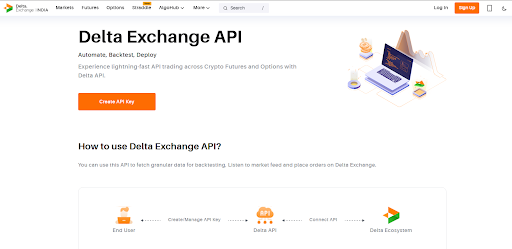
You can link your trading strategy to webhooks or APIs and let bots place trades for Bitcoin futures or other crypto options even when you’re away. If you want systematic, repeatable strategies with fewer missed opportunities, this setup feels practical and real.
And the best part? You don’t need to have any coding knowledge or degree – API Copilot does it all for you.
- Lower trading fees that don’t eat into your wins
Fees matter because every percentage point you pay is one less in your pocket after a winning trade. Delta Exchange offers competitive taker and maker fees, plus a fee cap on options that limits how much you pay on low premium trades.
This helps keep costs predictable, whether you’re trading Bitcoin or ETH futures and options. Traders who place frequent trades or use multi-leg strategies on the Indian crypto exchange can keep more of their gains, rather than having them eaten up by trading fees.
- Strategy Builder for practical trading plans
Strategy planning can get messy if the platform doesn’t help you visualize outcomes. Delta Exchange offers tools that let you craft crypto F&O setups with clear strike choices and expiries, plus daily, weekly, and monthly options for more precise timing. This helps you conveniently plan spreads, straddles, or hedges.
- Compliance and risk measures to know
It’s one thing to trade, another to trust the platform doing it. Delta Exchange is registered with India’s Financial Intelligence Unit (FIU) and follows local KYC and AML rules.
For risk management, the platform supports:
- Margin controls and stop-loss tools that help you manage positions while you trade Bitcoin or other crypto derivatives.
- Demo account to practice trades and understand the market without real money.
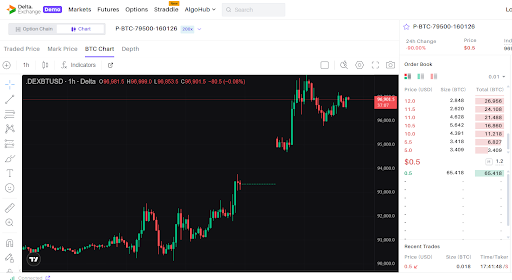
- Payoff charts show you how your trade will play out with breakeven points and maximum P&L.
This way, you can study your crypto trading strategy better before finalizing the trade.
Apart from these, Delta also offers leverage up to 200X – a good way to amplify your profits if the market moves in your favor.
The Bottomline
Indian crypto traders have moved far past the buy-and-hold phase. Spot crypto trading still has its place, yet most active users now want faster ways to make money from price swings, not wait months for a rally.
That’s where crypto F&O, spreads, and short-term setups step in. You want tools that let you react within minutes, control risk, and lock gains when the move shows up.
Platforms that only support basic coin buying just can’t keep up with that style of trading. Serious traders want flexibility, speed, and ways to work with volatility, not sit through it – and Delta Exchange caters to such traders well.
Disclaimer: Crypto trading carries inherent risks due to its high volatility. This article is for informational purposes only. Kindly do your own research before making any investment decisions.
Blockchain
MoonExe Aligns With the Next Phase of Stablecoin Payments as Global Regulation Accelerates

MoonExe today reaffirmed its strategic focus on stablecoin-powered payment infrastructure as global regulatory clarity continues to accelerate across major financial jurisdictions.
Regulators worldwide are advancing frameworks that formally recognize stablecoins as legitimate instruments for payment, settlement, and treasury operations. Legislative initiatives in the United States, expanded licensing regimes in Asia, and structured compliance approaches in other regions are collectively signaling a transition from experimental adoption to regulated, real-world deployment.
As stablecoins move deeper into mainstream financial infrastructure, demand is increasing for platforms capable of delivering real-time liquidity, transparent pricing, and verifiable settlement. MoonExe’s Exchange Finance (ExFi) model is designed to address these needs by enabling stablecoin-based currency conversions that operate continuously, without dependence on traditional banking cut-off times or geographic limitations.
The platform focuses on facilitating efficient value movement while maintaining transparency through public blockchain records. Transactions executed within the MoonExe ecosystem can be independently verified via standard blockchain explorers, reinforcing confidence through auditable, immutable data.
In parallel with regulatory progress, market participants are increasingly prioritizing infrastructure reliability over speculative activity. Stablecoins are being evaluated less as alternative assets and more as operational tools capable of supporting cross-border payments, digital commerce, and treasury flows.
MoonExe continues to expand its infrastructure and partnerships to support this evolution, positioning itself as part of the foundational layer required for stablecoins to function at global scale.
For more information about MoonExe and its stablecoin payment infrastructure, visit https://moonexe.com/
Blockchain
Playmaker to Launch in Q2 2026 as Midas Labs Expands Its AI-Powered Game Creation Ecosystem

Midas Labs, a UK-based Web3 technology company, has announced the upcoming launch of Playmaker, an AI-powered game creation and launchpad platform scheduled for Q2 2026. The platform is designed to lower barriers to game development and funding, operating as a core product within the UNIFI-powered Midas ecosystem.
Playmaker will provide creators, indie studios, and early-stage visionaries with an integrated environment to ideate, build, fund, and publish games without the traditional constraints of large teams or complex technical infrastructure. By combining AI-assisted creation tools with a structured launchpad and marketplace, the platform aims to streamline the path from concept to live product.
According to Jonathan Wheatley, Chief Marketing Officer of Midas Labs, Playmaker represents a natural progression of the company’s ecosystem strategy.
“Playmaker is about enabling participation at every level — from creators and developers to early supporters and players,” said Wheatley. “By integrating AI-driven creation with funding and publishing infrastructure, we’re building a system that allows ideas to move efficiently from concept to execution.”
The platform is powered by the $PLAY token, a fixed-supply utility asset used for project participation, creator payments, marketplace transactions, and ecosystem services. $PLAY operates within the broader UNIFI ecosystem, where UNIFI serves as the access and conversion layer, reinforcing liquidity and alignment across Midas Labs’ products.
Midas Labs has structured Playmaker’s token economy around a non-mintable, scarcity-driven model, designed to support long-term sustainability as platform adoption increases.
The Playmaker launch builds on recent Midas Labs milestones, including the expansion of the Midas Play Marketplace, multiple game releases, ecosystem partnerships, and the rollout of UNIFI staking infrastructure. Together, these components form a vertically integrated environment linking creation, funding, distribution, and participation.
Playmaker is scheduled to go live in Q2 2026, with phased ecosystem access beginning with early contributors before expanding globally.
About Midas Labs
Midas Labs is a United Kingdom–based Web3 technology company focused on building scalable digital ecosystems across gaming, AI, and creator-driven platforms. Powered by the UNIFI token, Midas Labs develops infrastructure designed for long-term participation, real utility, and sustainable growth.
-

 Crypto4 years ago
Crypto4 years agoCardalonia Aiming To Become The Biggest Metaverse Project On Cardano
-
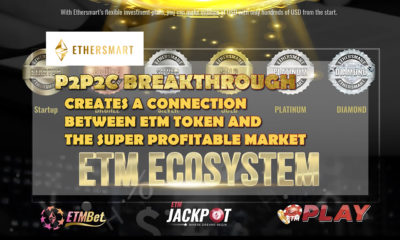
 Press Release5 years ago
Press Release5 years agoP2P2C BREAKTHROUGH CREATES A CONNECTION BETWEEN ETM TOKEN AND THE SUPER PROFITABLE MARKET
-
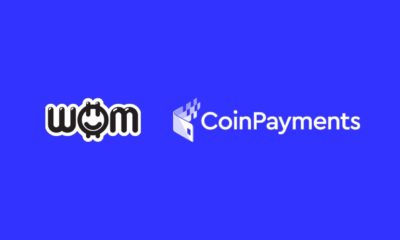
 Blockchain5 years ago
Blockchain5 years agoWOM Protocol partners with CoinPayments, the world’s largest cryptocurrency payments processor
-

 Press Release5 years ago
Press Release5 years agoETHERSMART DEVELOPER’S VISION MADE FINTECH COMPANY BECOME DUBAI’S TOP DIGITAL BANK
-
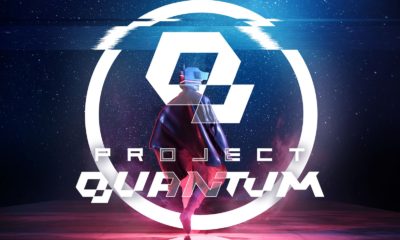
 Press Release5 years ago
Press Release5 years agoProject Quantum – Decentralised AAA Gaming
-

 Blockchain5 years ago
Blockchain5 years agoWOM Protocol Recommended by Premier Crypto Analyst as only full featured project for August
-

 Press Release5 years ago
Press Release5 years agoETHERSMART DEVELOPER’S VISION MADE FINTECH COMPANY BECOME DUBAI’S TOP DIGITAL BANK
-
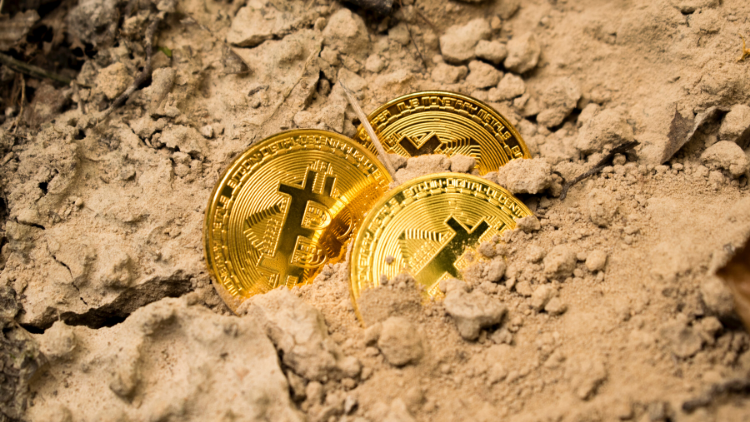
 Blockchain6 years ago
Blockchain6 years ago1.5 Times More Bitcoin is purchased by Grayscale Than Daily Mined Coins






